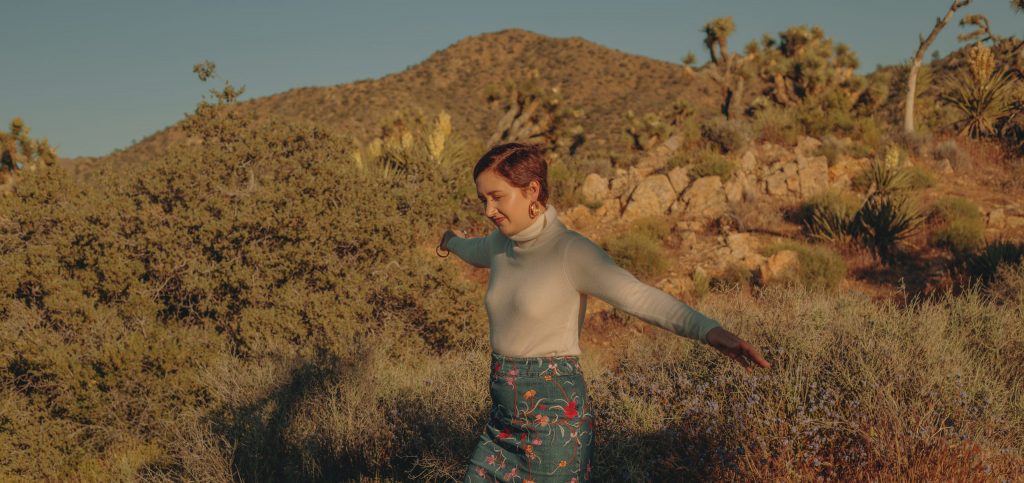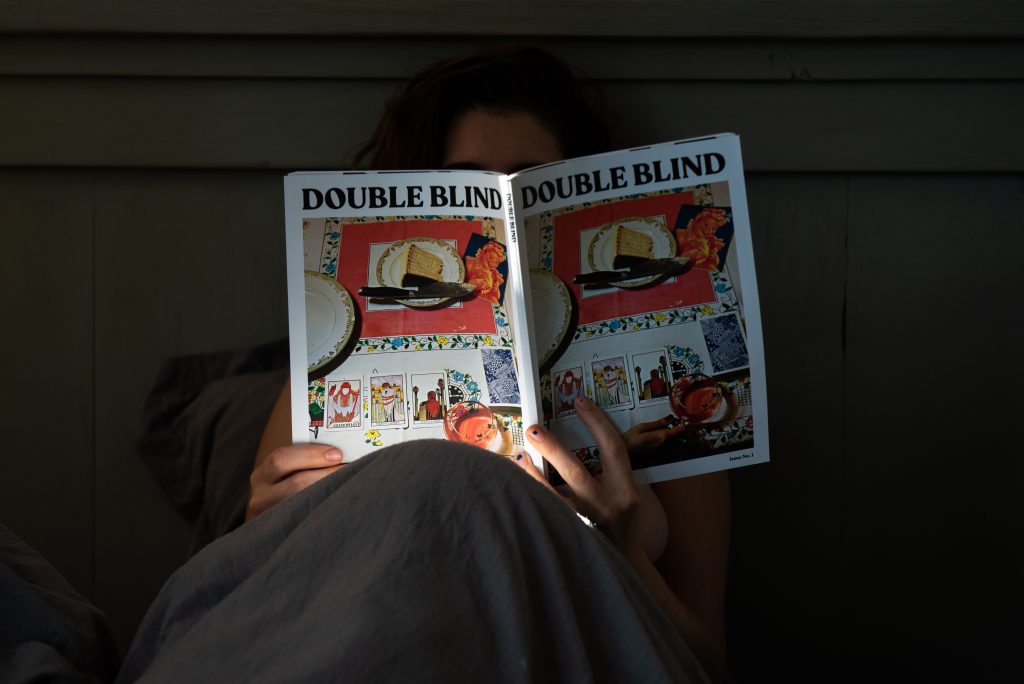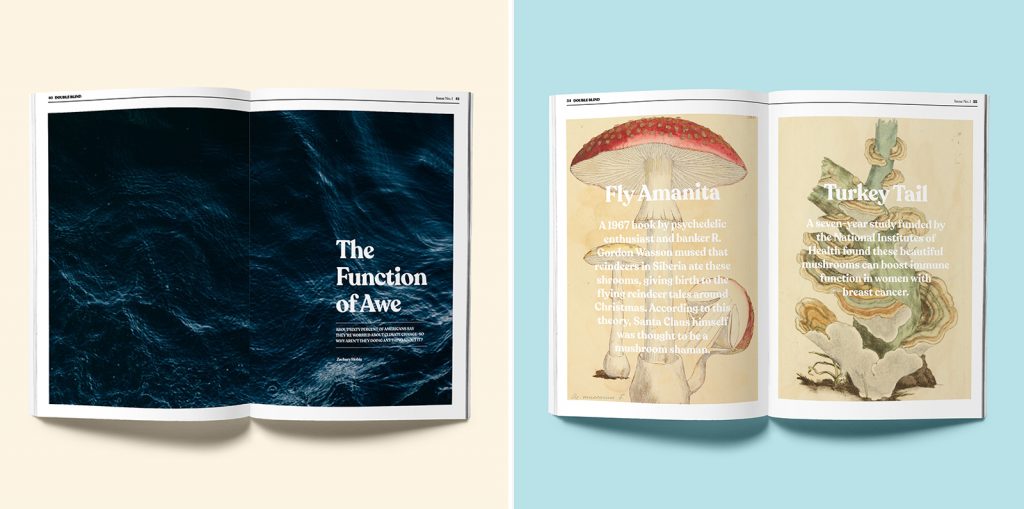Interview: Shelby Hartman, Co-Founder of Psychedelics-Focused DoubleBlind Magazine
Poetry, art, photography, thoughtful stories and in-depth reportage that explores the vast and ever-evolving space

Fittingly, the decision to start a magazine centered on psychedelics came to Shelby Hartman as she was meditating. “It just felt very definitive. It wasn’t like, ‘Oh, should I do this?’ It just felt like the thing to do,” she tells us about the realization, which occurred at her New Orleans apartment. A seasoned journalist within the cannabis and psychedelics realms, Hartman called her former Columbia Journalism School classmate, colleague and friend, Madison Margolin. “I literally just got up off my meditation pillow and was like, ‘Hey, do you want to do this thing?'” Margolin immediately agreed. DoubleBlind was born.

Hartman and Margolin are in an ideal position to helm a psychedelics-centered endeavor, having plenty of personal experience using them for spiritual and psychological growth, as well as reporting within the sphere for years.

Rather than a magazine about psychedelics, DoubleBlind (named for the type of randomized clinical study designed to prevent bias) tells stories through that lens; in the form of poetry, art, photography and features that explore everything from personal tales of tripping to deep dive reportage on science, sacred rituals, race, inclusion, law and beyond. Existing online and as a quarterly print magazine, DoubleBlind also offers courses on using psychedelics and growing mushrooms. “I would say the mission of DoubleBlind is two-fold. The first is to provide people with resources that they need to safely embark on a journey with plant medicines, should they feel inspired to do that,” Hartman explains. “And the second is this more investigative journalistic mission of trying to help the psychedelic industry unfold in a way that’s equitable and accessible.”

Equity and accessibility are paramount to the inevitable explosion of the psychedelics industry. Much like with cannabis, acceptance, use and understanding of psychedelics have been increasing rapidly and widely—coinciding with legalization becoming more and more likely. (Naturally occurring psychedelics are now legal in Ann Arbor, Denver, Oakland, Santa Cruz and Washington DC; and psilocybin is now legal across the state of Oregon in therapeutic settings.) While strides are being made within the cannabis industry—which has been (appropriately) criticized since many big brands are owned and run by white people, while thousands of Black and brown individuals remain incarcerated for activities that are no longer criminal—there’s a long way to go.
Undoubtedly, cannabis criminal justice reform is immediately crucial, so it’s encouraging that similar potential issues within the psychedelics realm seem to already be front of mind. “This is a really pivotal point for the psychedelic ‘industry’ because we are imagining what it will look like,” Hartman explains. “There already is many, many, many millions of dollars being invested in the psychedelic space by people who, frankly, are primarily well-capitalized white men from other industries. And there are also a lot of longtime players within the psychedelic field who are really concerned about equity and access and making sure that the most number of people have access to psychedelics when they get to market for healing.”

It’s a complex topic, but Hartman is optimistic—and makes note that many of those companies helmed by wealthy white men are also dedicated to access and equity. This future-proofing is reflected in several ways, one being various pledges that have already been instated, like the North Star Ethics Pledge. Hartman explains that it’s “essentially asking stakeholders in the industry to sign on to say they’re devoted to access and equity, and they’ve put forth various business models that they think would ensure that.”

DoubleBlind explored what psychedelic commercialization might look like in their fourth issue. “It’s basically talking about various regulations that should be put in place around patents and the patenting of certain psychedelic compounds for profit. There’s a lot of questions around like, what is the best type of legal entity to ensure equity? Is it for profit or is it non-profit? And, if it’s for profit, should we be requiring that everyone is a benefit corporation? And what does that look like? Then there’s also a lot happening in terms of trying to recruit and train therapists of color, so that when psychedelics get to market, there are people within the psychedelic medical paradigm who know how to reach out to and work with communities of color on their own healing. Even for-profit psychedelic drug development companies… think about questions around sacred reciprocity, like giving back to Indigenous communities who have a relationship to plant medicines.” As laws continue to change and public awareness around the benefits of psychedelics grows, so too will the private sector. “I do see a lot of important conversations happening,” Hartman says.

More broadly, psychedelics are increasingly being used for recreation and personal and spiritual growth. While it may seem there’s a magic mushroom renaissance occurring, Hartman says that the resurgence of plant medicine has been going on since the ’90s and many factors have contributed. Partly it’s been driven by the FDA approving several psychedelic studies after banning them for decades. “That sort of began the whole wave of psychedelic research and science that lended a lot of credibility to psychedelics as a potential disruptor of our current mental health paradigm,” Hartman explains.

While she notes that plant medicine has been used in “Indigenous communities for spiritual and therapeutic reasons for thousands of years, for generations upon generations,” Hartman believes that there’s also been “a loss of faith in general in the Western medical community, and millions and millions of people are seeking alternative solutions.” Additionally, in pop culture, there’s been a mainstreaming of psychedelics—from Michael Pollan’s How to Change Your Mind to Netflix’s “Have a Good Trip” and the immense popularity of Burning Man.

It’s this balancing and distilling of the vast psychedelics world that DoubleBlind achieves so successfully. From explaining sacred Indigenous rituals to pop culture stories, looking into the commercialization of psychedelics to advising people on how to trip safely, exploring philosophical concepts, connecting with nature to countless other subjects, the platform appeals to rookies and experts alike. And while the topics are boundless, they’re drawn together by one thread, Hartman tells us, “I think the thing that we care about most is healing.”
Hero image by Georgia Love












